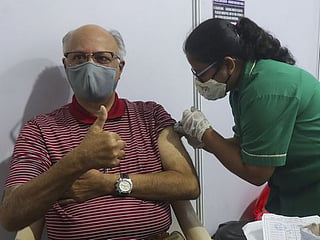Saudi Arabia warns of looming COVID-19 hunger crisis
Kingdom calls for swift action to secure access to food

Abu Dhabi: As the World Food Programme (WFP) warned that in addition to the threat posed by COVID-19, the world faces “multiple famines of biblical proportions” that could result in 300,000 deaths per day, Saudi Arabia has called for acting swiftly to secure access to food and avoid funding shortfalls.
In her speech to the Human Rights Council, a member of Saudi Arabia’s delegation to the United Nations, Sarah Aref, called for focusing on the COVID-19 pandemic, and the looming hunger crisis it caused.
Aref welcomed the report of the rapporteur on the right to food, Michael Fakhry, and his call upon countries to address the coronavirus pandemic by adopting a human rights-based approach.
Aref indicated that the final statement of the G20 summit hosted by Riyadh in November 2020 included a roadmap to combat the Corona pandemic and limit its global effects, as well as many commitments in the framework of solidarity in facing challenges, and ensuring a comprehensive recovery to address inequality, and ensure a sustainable future.
She emphasized that Saudi Arabia places the right to food at the center of its priorities. In 2018, it launched the Food Security Strategy emanating from the Saudi Vision 2030, whose goals include ensuring the right to safe food.
Aref indicated that the sustainable agricultural rural development programme was launched in 2020 in support of small agricultural producers, cooperative societies and rural institutions to enhance their capabilities.
She added that Saudi Arabia has provided, at the regional level, aid that supports institutions and individuals to help those affected by crises, securing food for them, and has launched 531 humanitarian projects related to food security.
The WFP has warned that there are currently 821 million food-insecure people in the world.
The report highlights 55 countries where 135 million people face crisis-level food insecurity— and that is without counting the impact of the COVID-19 pandemic, the response to which creates an “excruciating trade-off between saving lives or livelihoods or, in a worst-case scenario, saving people from the coronavirus to have them die from hunger.”
Sign up for the Daily Briefing
Get the latest news and updates straight to your inbox






![An aerial view shows Kingdom Tower in the Saudi capital Riyadh. [Illustrative image]](http://media.assettype.com/gulfnews%2Fimport%2F2020%2F05%2F26%2FSaudi-Riyadh_172500ec388_large.jpg?w=320&auto=format%2Ccompress&fit=max)
